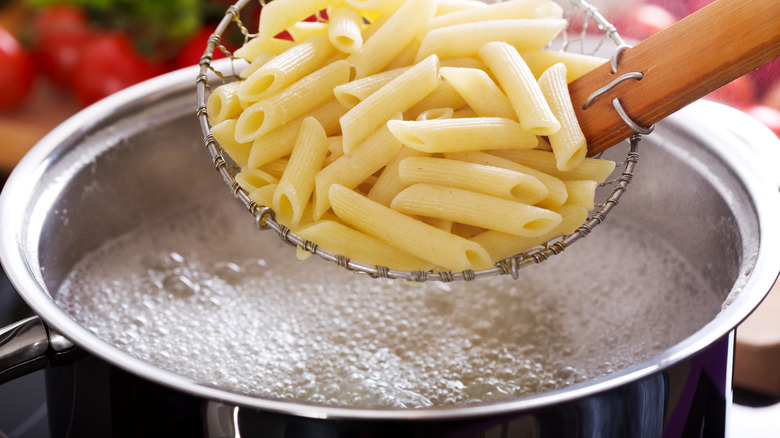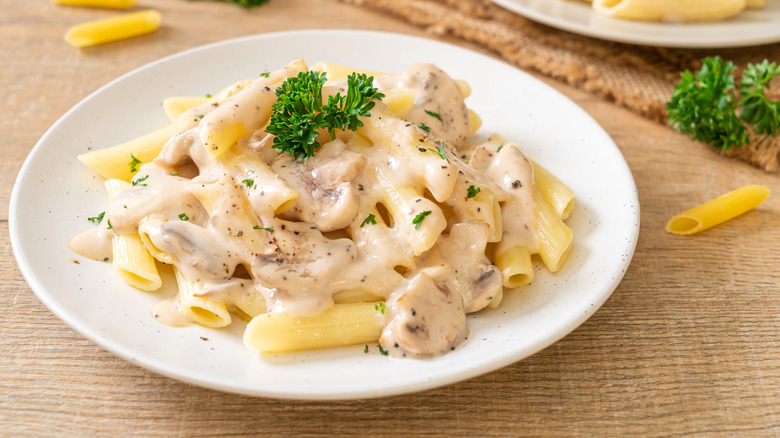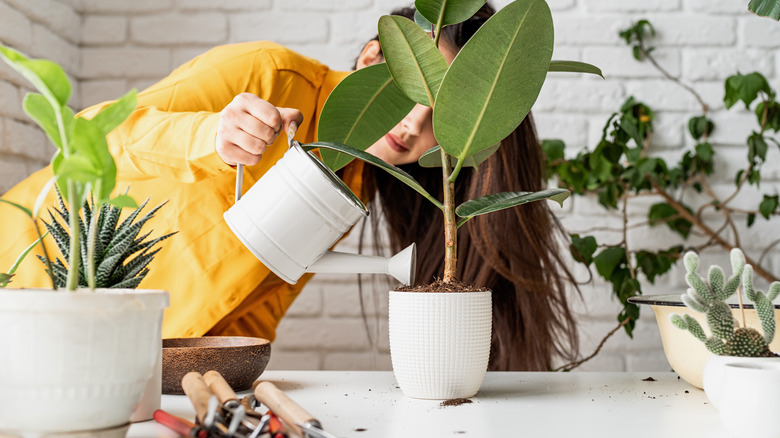The Absolute Best Uses For Your Leftover Pasta Water
There's a secret ingredient to cooking fantastic Italian style meals — from soups and sauces to freshly made bread — and the good news is that it won't cost you a dime extra. All you have to do is not throw out your pasta water after the pasta is finished. Sure, the leftover water looks a little cloudy. But trust us: the reasons for the cloudiness are the same reasons this water is such an invaluable aid, and in such a surprising variety of ways.
As Taste of Home explains, the cloudiness in the water after the pasta has been removed (tongs are the preferred tool for this) is the result of starches and salts imparted from the pasta during the cooking process. This is why the water has such value, or conversely, why it's such a waste to throw it out. These starches and salts, used properly, can help to enhance or augment other aspects of the meal. At the very least, keep a cup of the leftover pasta water to use for some of the following purposes.
Make restaurant-worthy sauces
Not only can leftover pasta water help you make great sauces, but its use can help thicken the sauce, and actually bind it to the pasta? Amazing, right? Hey, it's no secret that classic sauces like pesto, carbonara, and cacio e pepe are improved by the addition of pasta water. As a matter of fact, according to Food & Wine, pasta water is the secret to restaurant-level sauces. Who knew? Only every Italian restaurant ever.
There is a reason, after all, that Bon Appétit refers to leftover pasta water as "liquid gold." Adding hot pasta water to olive oil, butter, or the fat du jour in your sauce is actually a textbook example of emulsification. This is the Italian restaurant trick that makes their sauces taste so silky smooth ... and it can easily be your trick if you remember not to pour your leftover pasta water down the drain.
Make better bread and pizza dough
Home bakers take note: leftover pasta water can also help you make better bread. And that's not all. As Uno Casa points out, pasta water is the exact liquid that doughs call for: liquid with a bit of salt. Further, the starch in the pasta water will help to hold the dough together.
According to Nigella Lawson, pasta water's starches can actually help home baked bread to rise. Just use the pasta water in place of tap water or whatever water you typically use, observes Food & Wine, which also notes that leftover pasta water is a particularly good choice to use in Italian-style breads like focaccia.
With this said, home bakers should be sure to test the salt level of their pasta water first, as they may not need to add as much based on the level already in the water.
Use pasta water to water plants
Did you know leftover pasta water is great for watering your plants? It is. You have to let it cool down first, of course. The goal is to help your plants grow, not torture them. But per Flourishing Plants, pasta water provides plants with not only minerals but it can be used as an NPK fertilizer, which stands for nitrogen, phosphorus, and potassium. Further, the starchy water also promotes beneficial bacterial growth, which in turn can help you to grow healthier plants.
Turns out pasta water is a natural fertilizer. The one thing to avoid, according to pasta maker Barilla, is watering your plants with pasta water that has been seasoned or salted. The natural starches and salts imparted are just fine, however, and provide your plants with needed nutrients.
Using leftover pasta to water plants is also a form of recycling, and prevents waste. And now that you know the many uses this wonderful water can be put to — did we mention pasta water is great for soup broths? — there's no reason to ever waste it again.



